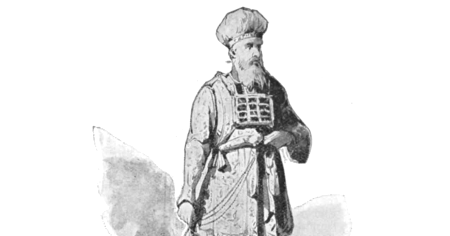Numbers 20 records a rather significant event in the early history of the nation of Israel. Aaron and his sons were appointed by God to be priests of the people at the establishment of the nation. “Now take Aaron your brother, and his sons with him, from among the children of Israel, that he may minister to Me as priest, Aaron and Aaron’s sons: Nadab, Abihu, Eleazar, and Ithamar. And you shall make holy garments for Aaron your brother, for glory and for beauty. So you shall speak to all who are gifted artisans, whom I have filled with the spirit of wisdom, that they may make Aaron’s garments, to consecrate him, that he may minister to Me as priest” (Exodus 28:1-3).
The promise was given that priests would arise from his family. “The priesthood shall be theirs for a perpetual statute” (Exodus 29:7). As Aaron became old, and neared death at Mount Hor, the Lord determined to invest his son Eleazar as the new chief priest. (Nadab & Abihu had died as God punished them for disobedience, cf. Leviticus 10:1-2).
The word invest, as I have used it in this context, means “to endow someone with a rank or office.” The term has as its origin the Old French/Latin “in” (into, upon) + “vistire” (clothe). The picture is of putting on a particular type of clothing as an insignia or symbol of authority.
The opposite of that word, divest, has as its prefix the Old French “des” (expressing removal). The picture would be of removing the official clothing to indicate a rescinding of a particular authority or office. With those words in mind, consider our text:
“Take Aaron and Eleazar his son, and bring them up to Mount Hor; and strip Aaron of his garments and put them on Eleazar his son; for Aaron shall be gathered to his people and die there.” So Moses did just as the Lord commanded, and they went up to Mount Hor in the sight of all the congregation. Moses stripped Aaron of his garments and put them on Eleazar his son; and Aaron died there on the top of the mountain. Then Moses and Eleazar came down from the mountain” (Numbers 20:25-28).
As Moses took Aaron’s garments off him, and placed them on Eleazar, Israel acknowledged the new position and authority that were “vested” in Aaron’s son. Note, this was done in response to God’s expressed will.
Taking authority that has not been properly vested, or endowed, is referred to as usurping. This is done too often in religious matters, as men misunderstand or disregard the will of God. For example, some women usurp the position of Pastor, which is limited to men (cf. 1 Timothy 3:1-2). The same is true when a woman seeks to take a lead role in worship and teaching. “But I suffer not a woman to teach, nor to usurp authority over the man, but to be in silence” (1 Timothy 2:12, KJV).
Pastors who exercise oversight outside of their own flock are usurpers (cf. 1 Peter 5:2). Men who take the position of pastor who have not been appointed to that task (cf. Diotrophes, 3 John 9-10) are usurpers. In fact when a man disregards any aspect of God’s instructions revealed in His will, he is guilty of a usurpation of authority. This is because he teaches “for doctrines the commandments of men” (cf. Matthew 15:9), rather than the commandments of God.
Jesus Christ has all authority “in heaven and on earth” (Matthew 28:18). As it has been “given” (invested) to Him, we should acquiesce and submit wholly to the dictates of His will, revealed in the scriptures. This we must do lest we too be guilty of being a usurper!
To see The Patternists Page on Facebook, click here, and Like!





